This adapted sermon from Jonah 4 shows how God wants to share his compassion to the point that he’s willing to bend heaven and earth.
In our journey through the first three chapters of Jonah so far, we’ve been through the storm (Jonah 1); we were in the belly of the fish (Jonah 2); and we went through Nineveh with Jonah (Jonah 3) as he called the Ninevites to repent.
And now in Jonah 4, we’re going to walk with him east of the city. We’ll see Jonah make a little hut, over which God sends a vine, a worm, and a scorching “easterly wind.” This section is partly a continuation of Jonah 3, but it’s also the conclusion to the story and message of Jonah.
And just in case the message on Jonah 2 did not convince you of his self-righteousness, this chapter should clearly reveal it.
Hopefully in this series, we’re seeing that:
Jonah had a heart problem to the most serious degree.
Jonah 4
But Jonah was greatly displeased and became angry. He prayed to the LORD, “O LORD, is this not what I said when I was still at home? That is why I was so quick to flee to Tarshish. I knew that you are a gracious and compassionate God, slow to anger and abounding in love, a God who relents from sending calamity. Now, O LORD, take away my life, for it is better for me to die than to live.”
But the LORD replied, “Have you any right to be angry?”
Jonah went out and sat down at a place east of the city. There he made himself a shelter, sat in its shade and waited to see what would happen to the city. Then the LORD God provided a vine and made it grow up over Jonah to give shade for his head to ease his discomfort, and Jonah was very happy about the vine. But at dawn the next day God provided a worm, which chewed the vine so that it withered. When the sun rose, God provided a scorching east wind, and the sun blazed on Jonah’s head so that he grew faint. He wanted to die, and said, “It would be better for me to die than to live.”
But God said to Jonah, “Do you have a right to be angry about the vine?”
“I do,” he said. “I am angry enough to die.”
But the LORD said, “You have been concerned about this vine, though you did not tend it or make it grow. It sprang up overnight and died overnight. But Nineveh has more than a hundred and twenty thousand people who cannot tell their right hand from their left, and many cattle as well. Should I not be concerned about that great city?” (NIV, 1984)
Toddler Mentality #1: Your Generosity Makes Me Angry and Afraid
Jonah 4:1: “But Jonah was greatly displeased and became angry.”
Jonah became angry at the compassionate relenting of Yahweh, his God. He wasn’t just a little bit angry. He was:
Irate. Fuming. Steaming with anger.
It reminds me of the older brother in what we typically call the story of the prodigal son (which is really the story of two lost sons).
There was a man who had two sons. The younger one said to his father, “Father, give me my share of the estate.” So he divided his property between them.
Not long after that, the younger son got together all he had, set off for a distant country and there squandered his wealth in wild living. After he had spent everything, there was a severe famine in that whole country, and he began to be in need. So he went and hired himself out to a citizen of that country, who sent him to his fields to feed pigs. He longed to fill his stomach with the pods that the pigs were eating, but no one gave him anything.
When he came to his senses, he said, “How many of my father’s hired men have food to spare, and here I am starving to death! I will set out and go back to my father and say to him: Father, I have sinned against heaven and against you. I am no longer worthy to be called your son; make me like one of your hired men.” So he got up and went to his father.
But while he was still a long way off, his father saw him and was filled with compassion for him; he ran to his son, threw his arms around him and kissed him.
The son said to him, “Father, I have sinned against heaven and against you. I am no longer worthy to be called your son.”
But the father said to his servants, “Quick! Bring the best robe and put it on him. Put a ring on his finger and sandals on his feet. Bring the fattened calf and kill it. Let’s have a feast and celebrate. For this son of mine was dead and is alive again; he was lost and is found.” So they began to celebrate.
Meanwhile, the older son was in the field. When he came near the house, he heard music and dancing. So he called one of the servants and asked him what was going on. “Your brother has come,” he replied, “and your father has killed the fattened calf because he has him back safe and sound.”
The older brother became angry and refused to go in. (Luke 15:11-28, NIV, 1984)
The prodigal son’s older brother didn’t know what to do with God’s grace and mercy, and he responded with anger.
This response is common to the people of God, especially the outwardly religious ones.
Jonah responded the same way.
God’s mercifulness was incomprehensible to him.
It blew his mind. He didn’t know what to do with it, and he responded with anger.
It’s like the stories I mentioned in our study of Jonah 3, of people like David Berkowitz. You almost feel angry that God could forgive such a heinous, evil, demonized serial killer who terrorized a whole city.
Yet God relented and did not bring upon him any worse calamity than the American penal institution, where he spent the rest of his life. God didn’t send him straight to hell. Kind of makes you feel a little angry if you think about it.
Jonah’s anger was the result of understanding the implications of their repentance for himself and for Israel.
I think Jonah knew that if God did not smite, kill, destroy and take out Nineveh as the Assyrians’ military outpost, that soon they would have the chance to attack Israel. He was thinking about their repentance in his own terms, not for God’s glory. He was thinking about God’s mercy in terms of how it impacted him, not God.
Jonah was still focused on himself, which the next verse makes clear.
Jonah 4:2 “He prayed to the LORD, ‘O LORD, is this not what I said when I was still at home? That is why I was so quick to flee to Tarshish. I knew that you are a gracious and compassionate God, slow to anger and abounding in love, a God who relents from sending calamity.”
It’s a funny thing to wag in your finger at God’s face for how gracious and compassionate he is. He sounds like a three-year-old right out of the gate. I knew you were a compassionate and gracious God.
I mean, listen to yourself, buddy! You’re not winning the argument here.
Jonah’s language about the “grace and compassion of the Lord” is interesting too — it’s almost a direct quote of what God said to Moses the second time Moses went up Mount Sinai.
Moses went up the mountain the first time with exuberance and optimism at what God was going to do with his covenant people. There God gave him the 10 commandments on stone tablets, and just before Moses departed, God said, to paraphrase Just so you know, the people are worshiping a golden calf right now. I could take them out and we could start over, just you and me.
Moses responded, Come again?
The Lord prodded, Go see for yourself.
Moses went down and, in his anger, he smashed the stone tablets because it was true.
Rewind a little, to Exodus 32:14, where it says that God relented from the disaster he could have brought upon the Israelites. Sound familiar? Moses said (to paraphrase the conversation):
Lord, I ask that you not destroy them?
(It was a sincere prayer, because he had just learned about it. He wanted to have another conversation with God.)
Do you see these children here? You brought them into the world; you brought them out of Egypt.
I wanted to destroy them, Moses. You’re the one who …
Then later, after he had destroyed the two tablets, he realized the devastation of Israel’s sin. He said in Exodus 33:
Okay look, if I’m going lead these people, you have to go with me. I can’t do this. Will you show me your glory?
So Moses went up the mountain a second time. The Lord hid him in a cleft in the rock and passed in front of Moses, saying:
The LORD, the LORD, the compassionate and gracious God, slow to anger, abounding in love and faithfulness, maintaining love to thousands, and forgiving wickedness, rebellion and sin. Yet he does not leave the guilty unpunished; he punishes the children and their children for the sin of their fathers to the third and fourth generation. (Ex. 34:6-7, NIV, 1984)
Moses and Jonah both saw the glory of the Lord, and both knew his character. Yet Jonah conveniently left out some key elements in his description of Yahweh his God, as you will see in this chart.
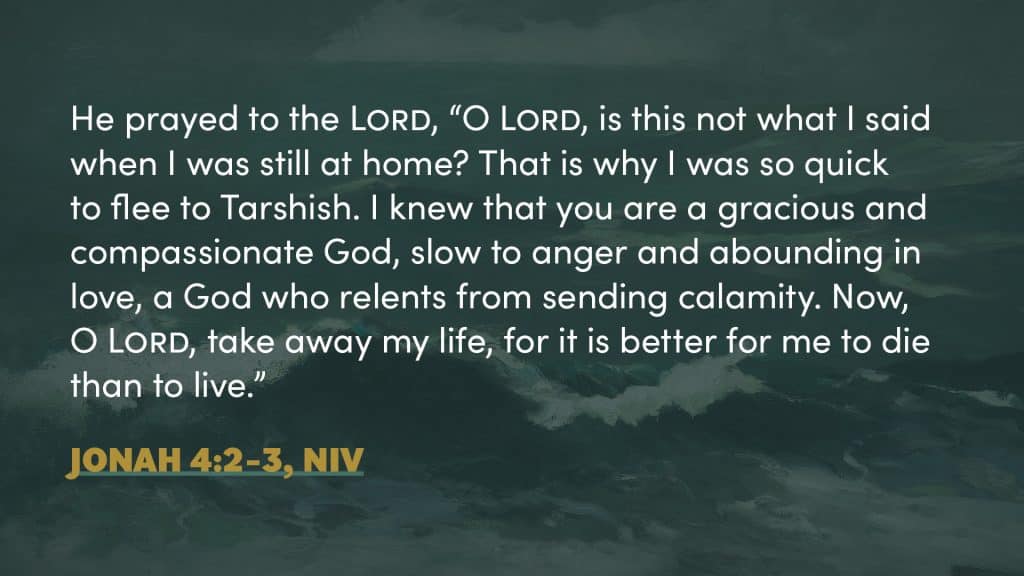
While Jonah praised God’s covenant faithfulness, his “abounding in love,” he neglected to mention God’s faithfulness to thousands.
The word “love” that Jonah uses here in Jonah 4:2 is the Hebrew word hesed, often translated in other verses as “lovingkindness.” The same word is used in the phrase “maintaining love to thousands” in Exodus 34:6–7.
Further, it’s the same word used in Jonah 2:8, which is translated “grace” by the NIV (1984):
Those who cling to worthless idols forfeit the grace that could be theirs.
The same guy who said that — (hint: Jonah) — conveniently left gaps in his theology as God listened patiently. Jonah still had some lessons to learn in the school of God.
Jonah 4:3 “Now, O LORD, take away my life, for it is better for me to die than to live.”
Now he’s really a toddler. Here’s the deal: Jonah genuinely felt that way.
God, this is so awful. Now my life is threatened by your grace. You, God, are impeding on my comfort. I had my life figured out. We had our territory, Israel, how I wanted it. My ministry was going how I wanted it to go, God, and you threw this wrench in it! I knew it.
He may have felt that way, but that wasn’t the whole picture. He was thinking of himself, not of the people outside of his own nation that God wanted to save. He had not yet learned that.
The phrase “better for me” does not belong in the economy of the kingdom of God.
Jonah 4:4: “But the LORD replied, ‘Have you any right to be angry?’
The conversational nature of God in Jonah 4 is truly remarkable. God was demonstrating toward Jonah the way he wanted Jonah to behave: to be “slow to anger.” That a phrase has been bubbling up in my heart this week, and I’ve been meditating on it.
Last night, I put the kids down at 7:30 pm. My wife was away. At around 7:45, my two-year-old, Joshua, got up and opened the door, disobeying what I had told him to do for the third time. The character of God came to my mind: “slow to anger.” Now, my anger is not like the Lord’s anger, and I was really mad at Joshua. But like it says later in this passage, he doesn’t know his “right hand from his left.” He doesn’t know what he’s doing.
When Joshua came out from his room, I asked him, “What are you doing, man? Why are you out?”
He said, “I came out to say hi.” It was really cute. He just wanted to connect.
I think God sees us — and saw Jonah — like that. “Have you any right to be angry, little buddy?”
While Jonah was not a toddler, but he was certainly acting like one.
Toddler Mentality #2: Punish Them, but Don’t Punish Me
Jonah 4:5: “Jonah went out and sat down at a place east of the city. There he made himself a shelter, sat in its shade and waited to see what would happen to the city.”
At this point, apparently the 40-day period had passed, and Jonah knew that God had shown mercy and spared the Ninevites. Yet he was still thinking, Maybe God will still smite them. Let’s go out and see what God’s going to do.
So he camped out to watch and wait.
Jonah 4:6 “Then the Lord provided a vine and made it grow up over Jonah to give shade for his head to ease his discomfort, and Jonah was very happy about the vine.”
The Lord provided.
Jonah had made himself a shelter, probably a mud hut. Now, it could be sweltering hot in the Middle East. Similar to, if not worse than, Tennessee summers. I believe this happened in the summer, so it would have been pretty hot. Odds are that his hut was not sufficient. So God provided a little vine for him.
Jonah 4:7-8: “But at dawn the next day, God provided a worm which chewed the vine so that it withered. When the sun rose, God provided a scorching east wind and the sun blazed on Jonah’s head so that he grew faint. He wanted to die, and said, ‘It would be better for me to die than to live.’”
Scholars say the “vine” was probably a castor oil plant. It prefers the sun. It starts small, but when it grows big, its huge leaves are perfect for providing shade. So Jonah was probably happy about it.
Why? Because he was still self-focused.
But then the Lord appointed a worm. The word for “appoint” is the same word used elsewhere in the book of Jonah for appointing the plant, appointing the easterly wind, and appointing the whale.
God was demonstrating his overwhelming sovereignty over Jonah’s life.
Jonah was probably bald, if I were to read into the situation (just a hair!). And as a bald man myself, I know that when it’s hot, you feel like Man, get me out of this! It could even become an I-wanna-die situation, depending on how extreme. But there was something deeper going on than just Jonah’s comfort. I think God was using this living metaphor to teach him something, if Jonah would have only paid attention.
In that moment, I think God was speaking prophetic language, referring to his people as a plant, as in these passages:
- “The vineyard of the Lord Almighty is the house of Israel. And the men of Judah are the garden of his delight” (Isaiah 5:7).
- “I had planted you [Israel] like a choice vine of sound and reliable stock. How then did you turn against me into a corrupt, wild vine?” (Jeremiah 2:21).
- “Watch over this vine, the root your right hand has planted, the son you have raised up for yourself. Your vine is cut down, it is burned with fire; at your rebuke your people perish” (Psalm 80:14-15).
God has a history of calling his people vines, branches, plants. But he also talks about his wrath in terminology of destroying plants.
Jesus picks up on this in John 15:5-6:
I am the vine; you are the branches. If a man remains in me and I in him, he will bear much fruit; apart from me you can do nothing. If anyone does not remain in me, he is like a branch that is thrown away and withers; such branches are picked up, thrown into the fire and burned.
If Jonah had truly been tuned in to God’s heart …
He would have recognized God’s prophetic call to Israel in what happened with the vine. To paraphrase God’s message: I made you come up quickly and I can take you out just like that. I’m going to send an easterly wind to your people just like I’m doing now to you.
And Jonah was mad about it.
Jonah knew what was going to happen.
We’ve talked about the Assyrian Empire. The Assyrians actually sacked some areas just north of Judah.
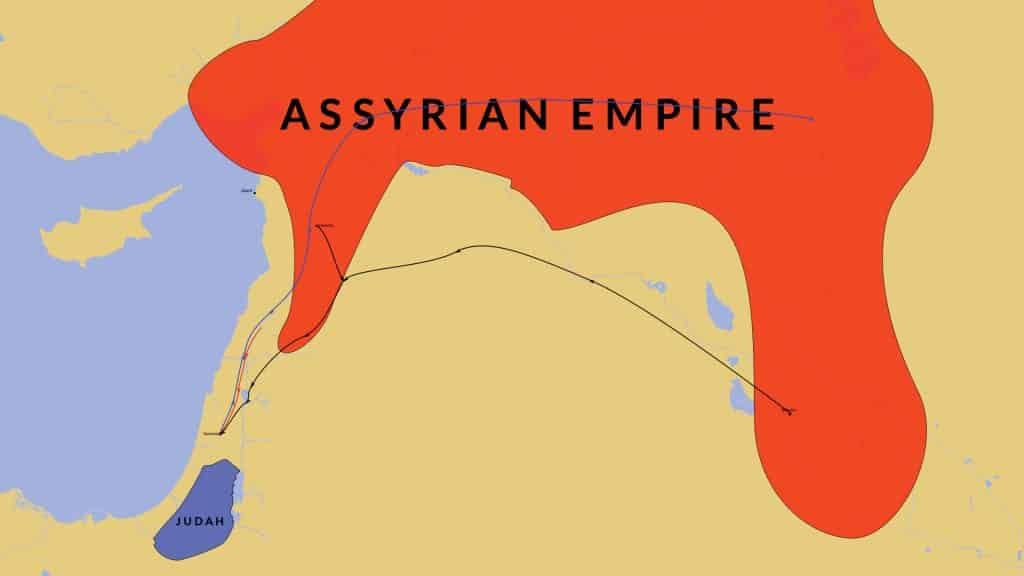
And then by 722 B.C., they came from the east and took over the whole place. Jonah knew about it; everyone knew about this enemy from the east. And he was mad enough to die.
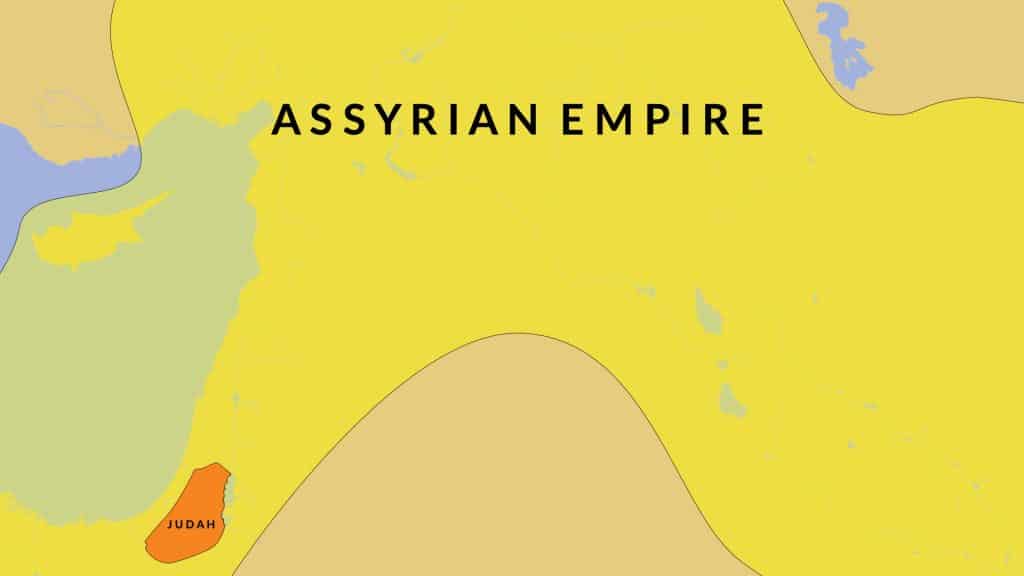
We can understand why Jonah was being a drama queen. He was genuinely terrified that his people would be ruined. He was pointing his finger at God because of exclusivity; he was ethnocentric, prejudiced against another people group.
Jonah was not happy with the Ninevites getting God’s grace because it would cost him something.
Jonah 4:9-10: “But God said to Jonah, ‘Do you have a right to be angry about the vine?’ ‘I do,’ he said. ‘I am angry enough to die.’ But the LORD said, ‘You have been concerned about this vine, though you did not tend it or make it grow. It sprang up overnight and died overnight.’”
Even though Jonah prophesied about Israel’s growth, it was not Jonah or Israel who made it grow.
Toddler Mentality #3: Sulking when Others Get Something Nice
Jonah 4:11: “But Nineveh has more than a hundred and twenty thousand people who cannot tell their right hand from their left, and many cattle as well. Should I not be concerned about that great city?”
In Luke 15, the older brother was angry because the father was throwing a party for his brother. The father pleaded with him to join them, but the son said, “Look! All these years I’ve been slaving for you and never disobeyed your orders. Yet you never gave me even a young goat so I could celebrate with my friends. But when this son of yours who has squandered your property with prostitutes comes home, you kill the fattened calf for him!” (vv. 29–30, NIV, 1984).
Should I not be concerned about that great city?
The father in Luke 15 said, “My son … you are always with me, and everything I have is yours. But we had to celebrate and be glad, because this brother of yours was dead and is alive again; he was lost and is found” (vv. 31–32, NIV, 1984).
Should I not be concerned about that great city?
We Christians can easily be insular and so focused on our family, on self, on our church, that we forget the heart of the father for the great city. In this text we call it Nineveh. But what if we each called it the name of our own city? Have we forgotten the great city around us? Those people who are corrupting our institutions:
Have we forgotten that God is concerned about those people, and that they are truly clueless?
Mat Kearney is one of my favorite artists. He wrote a song in the last few years, and it has this lyric that I can’t quite shake; it’s convicting to me.
For a little context. In 2019 and 2020 our church did something called Awaken Nashville. It was awesome. We prayed for the city. In 2019 we had a list of 17 names and prayed for 30 days for the lost. It was truly remarkable. And then in 2020 we did it again. We used Dave Clayton’s books Revival Starts Here and Jesus Next Door and prayed for eight people that we knew and cared about, fasting in various ways, for 30 days.
Then Mat Kearney came out with his song “Running in Circles.” I knew he lived in Nashville and would have been aware of this project. It says,
You got your hand on the Bible praying for revival / But you ain’t got the Savior’s love.
He was talking about us, church. We’ve got our hand on the Bible and we’re praying for revival, but we ain’t got the Savior’s love. Sound like Jonah?
Love for the lost loves others, even when it hurts. But our fears, our insecurities, and our apprehensions 100% get in the way of love like this.
Do you know that the number one thing preventing young people from going on the mission field is their parents?
Are we willing to die — not for selfishness, but for the salvation of the lost? That’s the cruciform way of life that Jesus shows us in the father who went out and pleaded with his older son about his brother, who was dead but was now alive.
God cares for the lost who are not like you or me.
In a sermon titled “The Education of a Prophet: Jonah” (May 3, 1981), John Piper described people who struggle like Jonah did:
They don’t like the free mercy of God. It calls their supremacy into question. What could make a Baptist Klansman angrier than to have to offer God’s mercy to a black community? What could make a Nazi angrier than to have to take the mercy of God to a Jewish ghetto? What could make a nationalistic American angrier than to have to bear the news of divine forgiveness to Tehran or Moscow? The lesson that God was trying to teach Jonah, and us through him, is that God loves to show mercy and that we his people should “do justice, love mercy, and walk humbly with our God” (Micah 6:8). And it’s implied in the very word “mercy” that no racial or ethnic or national barriers can disqualify a person from God’s love and our love.
If we’re really honest, we might see ourselves like Jonah: serving but still self-righteous; repentant but not fully giving our hearts to the Lord.
God’s Heart of Compassion
God invites us into his heart of compassion. How do we learn the compassion of God?
1. See yourself as you really are.
Are you angry? Are you prejudiced against other people groups? Do you categorize people by externals, whether it’s an ideology or an ethnicity?
Are you exclusive? Do you exclude people from the covenant in your heart and from your home because you don’t think God’s love goes that far, or it’s too far beyond your ability?
Are you like Jonah in these ways?
2. See God’s compassion as it is.
It’s free, it’s radical and it’s untamed.
3. See other people through God’s eyes.
They need God. We don’t see their facade or the puppet strings; we see right through them. We see them as people who are dead and lost. God says of people like that, I’ll do whatever it takes.
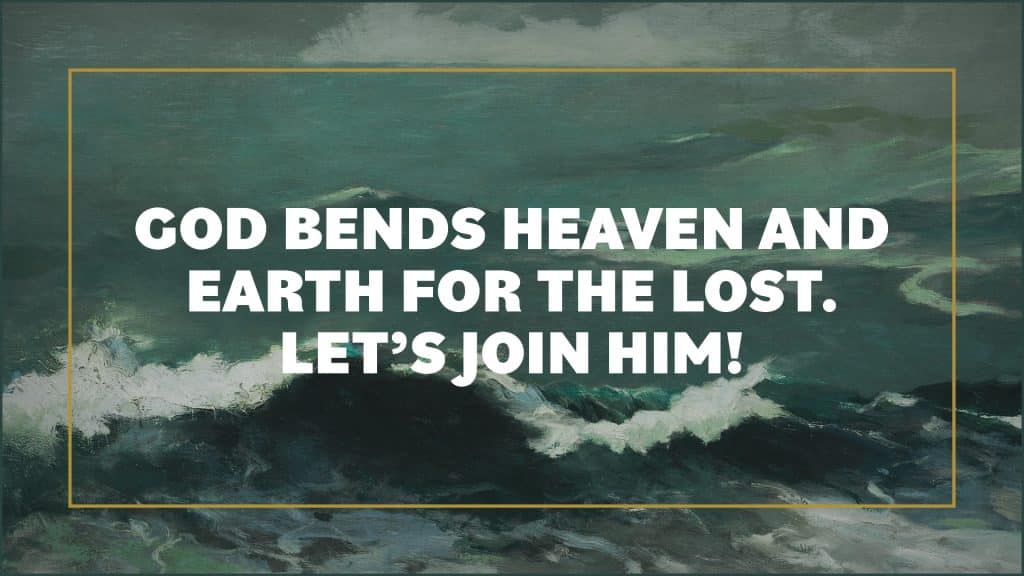
God bends heaven and earth for the lost. So let’s join him!
In Jonah 1, God took the skies and the seas and bent them towards his will for the nations. In Jonah 2, God allowed and appointed a whale to accomplish his means. And in Jonah 3, we saw how God could go, not just to the skies and the seas below, but to the very heart of humanity and convert them.
We end in Jonah 4 by looking into the heart of Jonah, the religious man of God.
God was willing to bend heaven and earth to save the Ninevites, and he did it. Then he asked, Jonah, will you join us at the party? Will you dance and celebrate these new family members that you once hated?
It’s a good question. It’s practical. What will you do with God’s incredible compassion?
What We Can Do
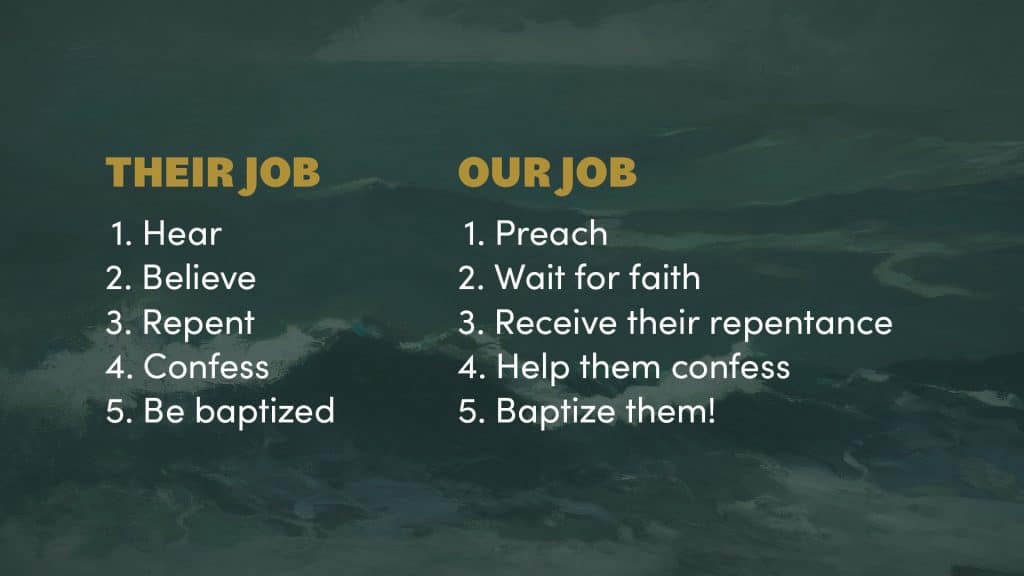
1. Know the steps of conversion so you can show someone how to do their part.
The early restoration movement talked about this easy-to-remember, five-finger exercise: Hear, believe, repent, confess and be baptized.
The Ninevites at least made it to step three in the chart above — they repented. Under the new covenant, it takes all five steps for someone to be saved into Christ.
2. Do your job.
When we call someone to Christ, you preach, and then wait for faith — you can’t generate that. Receive their repentance, which means “turn.” You can help them repent. Their confession is their verbal declaration, and baptism is their physical act in the process of conversion.
They have their job, and we have ours.
3. Let God do his job.
So what is God’s job?
God’s business is converting hearts.
Our job might be hard to do, but it’s actually pretty simple. The Lord does all the heavy lifting.
When I was a freshman at Ozark Christian College, I met a former Nazi skinhead. That year, I had been asking everyone their story, so I got his too. At first, I was afraid like this guy was the worst kind of racist, on every level — literally hating certain people groups.
I was surprised one day when he declared, “Hey, man, I want to get baptized.” I wondered, What? First of all, you’re in Bible college and you haven’t been baptized already? We baptized him in Turkey Creek a quarter mile from the college. It wasn’t hard for me to do, but I didn’t quite understand it: Whoa. What did I do? Did I even share the gospel with him? I don’t know how this happened!
So here’s what I want to say: Go do it.
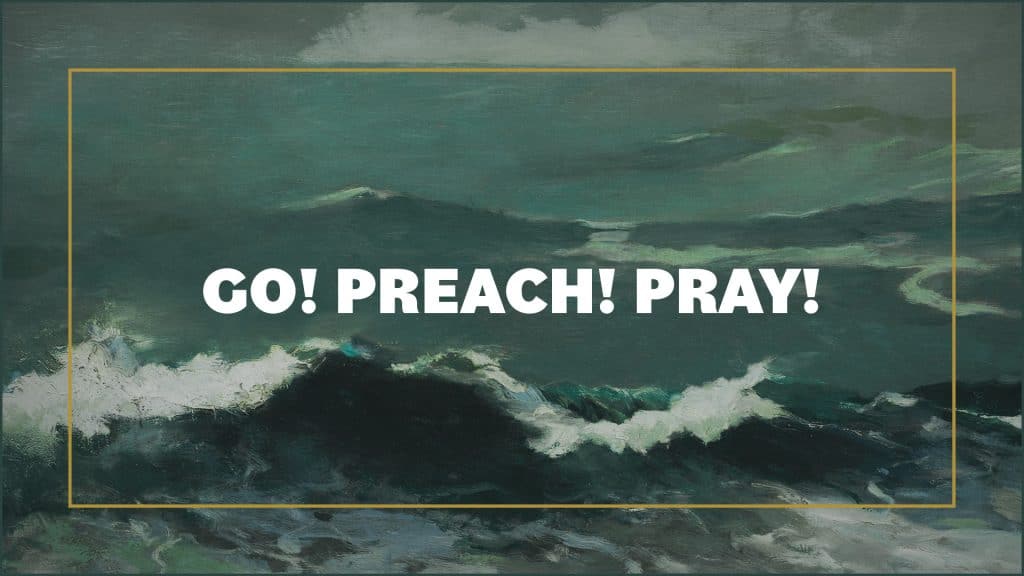
Just go; you don’t have to understand. Preach. You don’t even have to be a theologian. Now, don’t be preachy — no one wants preachy. But you must say the words. And then pray.
How do we show God’s compassion? What does it look like to have an incredible compassion for the lost?
First, it has to do with our relationship with God. It’s interesting that God allowed Jonah to go on mission and still be far from him. Did you know that John Wesley was converted after he was a missionary from England to the colony of Georgia? He was a missionary first, and then he got converted … the Lord is very patient with his people.
Have you been truly converted? Or was it a false gospel that you believed?
It’s okay if you’ve been in the pews for decades but still need the gospel. God invites you into the kind of relationship where you can actually hear his voice through the Holy Spirit. Your relationship can develop very quickly when you’re converted to Christ.
Then if God calls you, go to the beach on your college spring break to pass out tracts even though it feels cheesy and uncomfortable, even if you’d rather be doing something else.
If God calls you, invite those strange people over from across the street, even though you’re afraid.
If God calls you, go to the prison and submit to the leadership of the prison ministry. Even though you’re the boss at work, you submit to God’s work in your life. You might even miss Monday night football for three months because God called you to go.
You may have a child who has mastered more philosophical arguments against religion than you knew existed. If God calls you to go to that child, you stay up late studying at least the basic arguments so you can engage, so you can point out the lies with the kindness and slow-to-anger compassion of the Lord.
If you are hosting the Thanksgiving feast this year and God calls you to invite that person that the family has excommunicated, you invite them — even though you might disappoint some of your relatives.
Go. Preach. Pray.
The question God posed to Jonah is for you, too.
God wants to bend heaven and earth — and he will — but will we join him?
In the final chapter of Rediscovering Jonah, Tim Keller asks an interesting question: “Who wrote Jonah?”
It’s possible that someone else wrote the book. You can be an orthodox Christian and believe that, but I believe Jonah did write it. Assuming that he did, when Jonah took out the quill and wrote the story down, he was recording a prophetic call to Israel.
We know from the history books what eventually happened to Nineveh.
Read Nahum: God relented — but not forever.
And we know that in 722 B.C. God allowed the Assyrians to take over their land. God has compassion, but mixed with his compassion is his justice.
My point is this. Our time, the window for repentance, is short; it doesn’t last forever. Sometimes that’s hard to believe because God doesn’t take us out even if we continue in our sin. He’s so patient. But he’s not patient forever.
Yes, we need to go. Yes, we need to preach. Yes, we need to pray.
You can go on mission with a dirty cup but it’s not very effective; the dirt pours out with the water. The water will pour much clearer when you’ve been thoroughly washed yourself.
So yes, go! But go with a fresh cleansing from the Lord.
Of all the messages in Jonah, the most important one is this: repent.
Based on the context, Jonah’s core message is that Israel needed to repent of a lot of stuff. God can change anyone, even you and me. I’m 28 years into my journey with Christ, and God has healed certain areas in my life and heart. When I discover new things that he needs to be healed, taken away, or cut off, I can keep pressing on because of the hope of what God has already done.
Yes, let’s pray for revival. Yes, let’s go; let’s preach; let’s pray. But may we also repent.
Who wrote Jonah? Someone who was once lost and dead but was found and made alive again. Someone who didn’t know how far he was, even though he was so close. Someone whose heart was so hard toward his father that he couldn’t even feel it beating with anger.
God redeemed Jonah and made him whole again. If he could do that back then, how much more, with the Holy Spirit and with the gospel in our hands, can he truly change us?
“You got your hand on the Bible, praying for revival / But you ain’t got the Savior’s love.”
May that lyric not be true of us.
Rather, with God’s compassion for the lost and thanksgiving for what he has already done, let’s go, let’s preach, let’s pray and let’s repent!
Subscribe to HIM Publications here to get long-form discipleship content delivered to your inbox each week.
